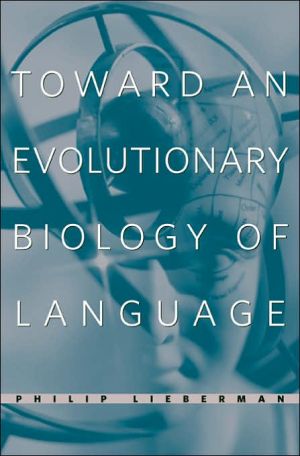Toward an Evolutionary Biology of Language
In this forcefully argued book, the leading evolutionary theorist of language draws on evidence from evolutionary biology, genetics, physical anthropology, anatomy, and neuroscience, to provide a framework for studying the evolution of human language and cognition.\ Philip Lieberman argues forcibly that the widely influential theories of language's development, advanced by Chomskian linguists and cognitive scientists, especially those that postulate a single dedicated language "module,"...
Search in google:
Evolution is opportunistic and has a "historic" logic of its own making. Existing structures and systems are adapted to serve new ends, often maintaining their original functions as well. Once a new behavior is in place, natural selection may then modify a structure to enhance that aspect of life; but some, or all, of the demands of the starting point may persist. …the brain mechanisms that yield human syntax ability also have evolutionary antecedents outside the domain of language. The subcortical basal ganglia structures of the human brain that are critical elements of the neural systems that allow us to comprehend the meaning or to form a sentence also continue to support neural circuits that regulate motor control as well as aspects of cognition, mood, and much else. The evolutionary record of the changes that yielded human language is evident in the morphology and physiology of the brain and body; disputes concerning the evolution of language follow from different readings of the text. Uncertainty arises because the text has become obscured; the species who possessed intermediate stage of language are extinct…. Nonetheless, the situation is not hopeless…the present anatomy and physiology of the human brain and body reveal its evolutionary history, which, in turn, provides insights on the nature of the biologic bases of human cognition, language, and other aspects of human behavior.—from Chapter 1 Joseph T. Devlin - Science Discussions of language tend to start from the assumption that it is a uniquely human trait without antecedent in the animal kingdom. Toward an Evolutionary Biology of Language forcefully challenges this assumption. Lieberman brings together a wide range of evidence from comparative anatomy, physiology, neurobiology, genetics, neuropsychology, and linguistics to illuminate the protolinguistic abilities in other species.
1The mark of evolution12Primitive and derived features of language283The singularity of speech674The neural bases of language1305Motor control and the evolution of language2146The gift of tongue2467Linguistic issues3178Where we might go364
\ ScienceDiscussions of language tend to start from the assumption that it is a uniquely human trait without antecedent in the animal kingdom. Toward an Evolutionary Biology of Language forcefully challenges this assumption. Lieberman brings together a wide range of evidence from comparative anatomy, physiology, neurobiology, genetics, neuropsychology, and linguistics to illuminate the protolinguistic abilities in other species.\ — Joseph T. Devlin\ \ \








